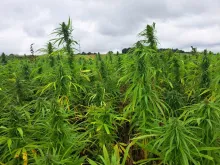A multi-million pound programme of strategic research delivered over five years providing science and evidence to support policymakers and its partners. Informed by strong partnerships and the needs of a broad range of stakeholders. Science at the heart of society contributing to the health, wealth and wellbeing of Scotland and beyond.
Ongoing research (2022-2027)
Flows of antimicrobial resistance and pathogens through environment to food chain
This research aims to quantify the flow of antimicrobial resistance genes and pathogens from the environment to the food chain and directly to humans in the farm environment under different farming practices. This will be integrated with social science work on antimicrobial use. Both quantitative and qualitative data will be used to develop a risk assessment model based on a Bayesian Belief Network.
Food and drink innovations: models of policy support and other incentive mechanisms
This project is providing evidence for understanding factors leading to demonstrable change in innovation and investment in Scottish food supply chains, in particular the role of policy and government support through (1) mapping and (2) ranking incentives to innovation uptake by their effectiveness; and (3) developing models of support to innovation uptake at supply chain level feeding into an innovation uptake incentive framework at sectoral level.
Food and drink manufacturing: Establishing baseline contributions to climate change and identifying scope for reduction of environmental impacts
This project is providing baseline measurements of greenhouse gas emissions and energy usage for various of Scotland’s food and drink production, as well as manufacturing processes. We are also developing a case study for the malting industry and providing datasets and tools to show how these processes can be optimised to reduce the environmental impact of producing and manufacturing food and drink products.
Fruit for Thought: Investigation of nutrition and health properties of new soft fruit crops grown in Scotland
Soft-fruit producers have an increasing need to find more climate resilient crops that require fewer inputs in terms of labour and pesticides. To make these changes producers, need help, namely getting the public to have confidence in the new types of soft fruit. The aim of this project is to investigate the healthiness of the alternative soft fruit crops grown in Scotland to help to market them.
Galvanising change via natural capital
The aim of this project is to produce constructive insights about the most productive venues (territorially and sectorally) and approaches (how and with and for whom) for using natural capital concepts and data to galvanise change for sustainability.
Habitat management and restoration
This project assesses how specific land uses and management activities affect biodiversity and ecosystem services to inform land use policy.
Harnessing the gut microbiome to strengthen livestock resilience against carriage and infection by pathogens
Infectious diseases, particularly when caused by antibiotic-resistant pathogens, are major problems in farmed animals. New treatments are urgently needed to reduce infections. We aim to address this by harnessing the animal intestinal microbiome to boost their defence. We will screen our diverse gut bacterial culture collections to identify health-associated microbes with potent activity against pathogens, including antibiotic resistant strains
Healthy diets for a healthy weight: exploring physiological mechanisms related to dietary fibre and non-nutritive sweeteners
The Scottish diet remains poor quality and a main factor in driving unhealthy weight. To reduce the burden of diet related disease, this project explores public attitudes towards nutritional factors, namely food additives (specifically artificial sweeteners) and dietary fibre. The purpose of the study is to understand how dietary fibre influences appetite and food intake and then, how sweeteners may disrupt this response. We are implementing two human diet trials to investigate these key dietary components on physiological mechanisms associated with appetite control for a healthy weight. We also examine the changes in the profile of bacteria that inhabit the gut and the associated metabolic products. We investigate the effects on human blood metabolites such as blood sugar and circulating changes in hormones that are thought to influence appetite.
Healthy soils for a green recovery
A healthy soil can provide us with nutritious food, clean water, provide habits for biodiversity, and can slow the impacts of climate change. This project will strengthen our understanding and help protect soils, improve soil health, and identify the roles and contributions of Scotland’s soils in delivering key beneficial services (e.g. food production and other wider benefits).
Hemp: a climate resilient crop for the future of Scottish agriculture
The Scottish Government's Climate Change Plan includes reference to carbon sequestration options for agriculture. This project research supports hemp, a climate resilient crop, for stimulating Scottish farming sector to run greenhouse gas removal activities, identifying opportunities for the Scottish food and drink sector to promote sustainability and by understanding nutrition sufficiency and consumer acceptance of hemp food as part of low carbon footprint diet.
